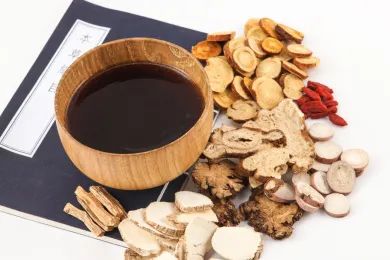Click the blue text above to follow us
Phlegm-damp constitution, as the name suggests, is a condition characterized by an excess of phlegm and dampness in the body. This condition is commonly referred to in folk terms as having “too much dampness.” Individuals with this constitution often exhibit obesity, a soft and distended abdomen, a heavy sensation in the body, and tend to feel fatigued with minimal exertion. The tongue is typically enlarged with a white, greasy coating, and stools may be sticky or loose.
As stated in the Huangdi Neijing (Yellow Emperor’s Inner Canon), “Phlegm and fluids are another name for water and dampness,” indicating that phlegm is a transformation of water and dampness. So how is water and dampness formed? The spleen governs the transformation and transportation of water and dampness, while the kidneys govern water. This means that water and dampness are a result of yang deficiency in both the spleen and kidneys. When the yang of the spleen and kidneys is deficient, their ability to transform and transport water and dampness is weakened, leading to the stagnation of water and dampness within the body. Yang is active, while yin is passive; therefore, the stagnation of water and dampness can be determined as a deficiency of spleen and kidney yang. Furthermore, “Blood flows with heat and congeals with cold”; when the spleen and kidneys are cold and yang deficient, qi and blood naturally become obstructed.
 01
01
Common Manifestations of Phlegm-Damp
The common manifestations of phlegm-damp include:
Excessive phlegm, obesity, chest tightness and shortness of breath, weakness in the limbs, oily skin on the face, pale yellow and dull complexion, slightly swollen eyelids, tendency to feel drowsy, pale complexion with a bluish tint, and lack of luster. The tongue is typically enlarged with a slippery and greasy coating, which may be white or sweet, and often has teeth marks along the edges. There may be no thirst, and symptoms can include cough and asthma, manifesting as chronic bronchitis, obstructive pulmonary disease, or asthma.
 02
02
Why Does Phlegm-Damp Constitution Develop?
1. Diet:
Food is essential for life, but choosing the right foods is crucial for health. Nowadays, with improved living conditions, people eat well, which can lead to phlegm-damp conditions. The spleen governs the transformation and transportation of food, which involves two aspects: the digestion and absorption of ingested food and the metabolism of bodily fluids. Regular consumption of cold, hard-to-digest foods can burden the spleen and stomach, leading to a decline in their ability to metabolize fluids, resulting in phlegm-damp formation. Phlegm-damp is a yin pathogen that can easily harm yang qi, so food choices should favor warming and invigorating foods such as ginger, scallions, garlic, and Sichuan pepper. Some foods, while effective in resolving dampness, may be too cold and should be paired with warming foods to avoid exacerbating yang deficiency. Foods like seaweed, red beans, coix seeds, and winter melon are considered cooling and should be consumed with caution. If a person feels overly full after eating, it indicates that their spleen and stomach are already quite deficient and cold, necessitating the combination of cooling foods with warming ones. Otherwise, excessive consumption of cold foods will further damage spleen yang, leading to increased weight.
When phlegm-damp persists in the body for a long time, it can lead to diseases such as excessive cough with phlegm, asthma, dizziness, gastrointestinal discomfort, and vomiting. Treatment should involve warming and drying herbs to resolve phlegm, rather than relying solely on dietary adjustments, which can only serve as an auxiliary measure and cannot replace treatment.

2. Emotions:
Traditional Chinese Medicine (TCM) emphasizes the holistic concept of “body and spirit as one.” The body refers to the physical form, while the spirit refers to thoughts and consciousness. The body is the material basis for the spirit’s activities, and the normal functioning of the spirit can also adjust the health of the body. For example, some individuals who were once decisive and fearless may become fearful and anxious after prolonged illness. Others may fixate on a minor ailment, worrying excessively about serious conditions like cancer, which can lead to depression. These are examples of how physical ailments can adversely affect mental health. Overthinking and suppressed emotions can also lead to digestive issues, insomnia, and other physical ailments. A cancer patient may feel fine until diagnosed, at which point excessive fear can lead to rapid decline, illustrating that the fear of death can be as detrimental as the disease itself.
This reflects the TCM view that the body and spirit influence each other.
In TCM, emotions are associated with the five organs: grief corresponds to the lungs; joy (or shock) corresponds to the heart; overthinking corresponds to the spleen; anger corresponds to the liver; and fear corresponds to the kidneys. The essence of life is merely a flow of qi. TCM diagnosis and treatment are fundamentally based on the movement and changes of qi. However, the metabolism of water and dampness primarily affects the lungs’ regulation, the spleen’s transformation, the liver’s drainage, and the kidneys’ qi transformation. The most commonly observed are the spleen’s transformation and the liver’s drainage.
The liver is the source of yang qi; when liver qi is smooth, it allows kidney yang qi to flow to the spleen, enabling normal transformation functions. Excessive worry and suppressed emotions can obstruct the liver’s upward movement, a condition known in TCM as “liver qi stagnation.” When liver qi stagnates, the spleen’s transformation function is impaired, leading to the inability to process water and dampness, resulting in internal phlegm-damp accumulation.
For diseases caused by emotional factors, emotional release is crucial. This approach, known in TCM as “regulating emotions,” is akin to psychological therapy in Western medicine. A psychotherapist helps normalize patients’ emotions through behavior and dialogue. For those who are often depressed, according to the Neijing, principles such as “joy overcomes sorrow” and “anger overcomes overthinking” suggest that one should actively seek joy, participate in social activities, and engage in collective entertainment. Watching comedies, listening to uplifting music, and avoiding tragedies can help improve emotional well-being. For those with excessive repression, expressing anger can help release pent-up emotions, a method in TCM referred to as “release through anger,” which means using the upward nature of anger to unblock stagnant qi and restore normal emotional states.
Individuals who are overly concerned about gains and losses or who suppress their emotions should consume more foods that promote qi circulation, such as Buddha’s hand, oranges, tangerine peel, leeks, fennel, garlic, cilantro, ginger, sword beans, and citrons.

3. Exercise:
Life is movement; appropriate exercise is highly beneficial for health. Exercise can help relax the mind and serve as a distraction for those with suppressed emotions. During exercise, blood flow increases, promoting the circulation of qi and blood, enhancing metabolism, and facilitating the elimination of abnormal bodily fluids. The spleen governs the limbs, and appropriate limb exercises can enhance the transformation function of the spleen and stomach. We often observe that individuals who exercise regularly maintain good physiques, while those who lead sedentary lifestyles, such as taxi drivers or office workers, often develop large abdomens and frequently report digestive issues, with tongues appearing pale and swollen. This illustrates that a lack of exercise can lead to improper metabolism of bodily fluids, resulting in internal phlegm-damp obstruction.
Therefore, individuals with phlegm-damp constitution, who are often overweight and easily fatigued, should strive to maintain a regular exercise routine. The intensity of activity should gradually increase; starting with moderate aerobic exercises like jogging or brisk walking can yield good results. Excessive exercise may not achieve the desired effect, as overweight individuals often have qi deficiency, and excessive sweating during intense workouts can deplete qi. When qi is depleted, the body’s yang qi must expend more energy to repair itself, which can hinder achieving optimal results.

4. Treatment Methods:
Currently, the medical environment is characterized by the misuse of antibiotics and intravenous drips; the indiscriminate use of non-steroidal anti-inflammatory drugs (such as cold medications and pain relievers for menstrual cramps or joint pain) is prevalent; and there is also the rampant use of Chinese herbs for clearing heat and detoxifying.
These cold and cooling medications, when used frequently, can directly harm the yang qi of the spleen and stomach. When spleen yang is damaged, its ability to transform and transport is weakened, leading to the generation of phlegm-damp. Prolonged use of cold medications can not only harm spleen yang but also kidney yang, resulting in a pathological condition known as “spleen and kidney yang deficiency.” With weakened qi transformation in the kidneys and impaired transformation in the spleen, the accumulation of phlegm-damp will only increase.
Therefore, in modern treatment, it is essential to consider the aspect of yang qi. Some may wonder why children today struggle to recover from a simple cold; this is primarily due to the overuse of cold medications, which harm their yang qi, impairing their ability to resist external pathogens and leading to recurrent colds. The famous Qing Dynasty physician Xu Dachun stated, “Mismanagement of a cold can lead to exhaustion,” which is very insightful.
The core of the human body lies in the spleen and stomach, which are the foundation of life. Treating illness requires preserving the foundation; a doctor who cannot maintain the patient’s life foundation cannot claim to treat illness.

Previous Recommendations
Mastering TCM requires good reading.
The correct way to “stick to autumn nourishment”
Supporting yang is the primary method for modern sub-health recovery
Beijing Fuyang International TCM Research Institute
WeChat ID: bjfygjzykxyjy
Scan to follow and learn more

Tap to view, you are the best

